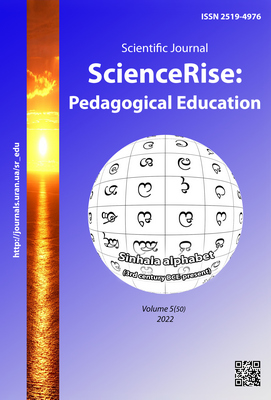Negative effects of mobbing among primary school teachers
DOI:
https://doi.org/10.15587/2519-4984.2022.265391Keywords:
mobbing, gaslighting, bullying, pressure, teacher, environment, terror, consequences, methods, foreign experienceAbstract
The article is devoted to the problem of negative consequences of mobbing among primary school teachers. Based on the analysis of philosophical, psychological and pedagogical literature, the state of problems is revealed. The task of this article is to analyze the problem in domestic and foreign pedagogical science and practice, to reveal the peculiarities of mobbing, the specifics of its manifestation and consequences in general educational institutions among primary school teachers.
The article analyzes mobbing as a social problem. A terminological study of various manifestations of behavior, related to putting pressure on the employee and humiliating his/her dignity, was carried out. The essence of mobbing, its structure is revealed. The forms of mobbing among primary school teachers are characterized. The consequences of mobbing for an individual, school team and society as a whole are systematized. Directions for further research on the problem of mobbing are outlined. The analysis of international and domestic experience shows that the problems of mobbing are extremely difficult to overcome. Mobbing in many countries is perceived as a serious problem that needs to be fought. Mobbing leads to serious psychological and psychosomatic diseases that make a person powerless and destroy his/her self-esteem. Mobbing has a negative impact not only on the victim, but also on his/her immediate environment - family, friends. Teacher mobbing also has a detrimental effect on students. In Ukraine, there is no specially created legal mechanism for combating bullying at the workplace of employees, but a draft law is being developed, which includes an explanation of the term and a list of the main fines for such actions.
The practical significance of the article is that its materials can be used in the organization of the educational process of general education institutions and primary school teacher training
References
- Franco, D., Valcke, M., Vanderlinde, R. (2021) The use of virtual reality simulations to foster competence development of preservice teachers. Developing and stimulating competencies: Methodological challenges and opportunities for research. Available at: https://www.researchgate.net/publication/356612467_Dealing_with_verbal_aggression_in_the_classroo Last accessed: 25.08.2022
- Malik, N. A., Björkqvist, K. (2019). Workplace bullying and occupational stress among university teachers: Mediating and moderating factors. Europe’s Journal of Psychology, 15 (2), 240–259. doi: https://doi.org/10.5964/ejop.v15i2.1611
- Shelley, W. W., Pickett, J. T., Mancini, C., McDougle, R. D., Rissler, G., Cleary, H. (2017). Race, Bullying, and Public Perceptions of School and University Safety. Journal of Interpersonal Violence, 36 (1–2), 824–849. https://doi.org/10.1177/0886260517736272
- Attell, B. K., Kummerow Brown, K., Treiber, L. A. (2017). Workplace bullying, perceived job stressors, and psychological distress: Gender and race differences in the stress process. Social Science Research, 65, 210–221. doi: https://doi.org/10.1016/j.ssresearch.2017.02.001
- Milner, A., Witt, K., LaMontagne, A. D., Niedhammer, I. (2017). Psychosocial job stressors and suicidality: a meta-analysis and systematic review. Occupational and Environmental Medicine, 75 (4), 245–253. doi: https://doi.org/10.1136/oemed-2017-104531
- Suggala, S., Thomas, S., Kureshi, S. (2019). Impact of Workplace Bullying on Employees’ Mental Health and Self-Worth. The Palgrave Handbook of Workplace Well-Being, 1–20. https://doi.org/10.1007/978-3-030-02470-3_30-1
- Soroka, O. (2013) Essence, aftermath and prevention of mobbing in the workforce. Modern directions of theoretical and applied researches. Available at: https://www.sworld.com.ua/konfer30/1051.pdf Last accessed: 25.08.2022
- Kachmar, O. V. (2016). Mobbing as a form of psychological violence in labor collective. Aktualni problemy filosofii ta sotsiolohii, 14, 58–61.
- Alieksieienko, T. (2018). Bulinh i Mobinh – Prychyny rozvytku i shliakhy profilaktyky. Osobystist u prostori vykhovnykh innovatsii, 19–25.
- Shcho take mobinh? (2021). Available at: https://znayshov.com/News/Details/shcho_take_mobinh Last accessed: 25.08.2022
- Profesiinyi standart vchytelia pochatkovykh klasiv, vchytelia zakladu zahalnoi serednoi osvity i vchytelia z pochatkovoi osvity (2020). Nakaz Ministerstva rozvytku ekonomiky, torhivli ta silskoho hospodarstva Ukrainy No. 2736-20. 23.12.2020. Available at: https://rada.info/upload/users_files/41868892/07679bad4b9af36be54148ac42826c1b.pdf Last accessed: 28.09.2022
- Bernotaite, L., Malinauskiene, V. (2017). Workplace bullying and mental health among teachers in relation to psychosocial job characteristics and burnout. International Journal of Occupational Medicine and Environmental Health, 30, 629–640. doi: https://doi.org/10.13075/ijomeh.1896.00943
- Yragui, N. L., Demsky, C. A., Hammer, L. B., Van Dyck, S., Neradilek, M. B. (2016). Linking Workplace Aggression to Employee Well-Being and Work: The Moderating Role of Family-Supportive Supervisor Behaviors (FSSB). Journal of Business and Psychology, 32 (2), 179–196. doi: https://doi.org/10.1007/s10869-016-9443-z
- Miroshnikova, A. (2018). Yak vchyteliu protydiiaty tskuvanniu v pedkolektyvi. Available at: https://osvitoria.media/experience/yakshho-vchyteliv-tskuyut-kolegy/ Last accessed: 25.08.2022
- Shockley, K. M., Shen, W., DeNunzio, M. M., Arvan, M. L., Knudsen, E. A. (2017). Disentangling the relationship between gender and work–family conflict: An integration of theoretical perspectives using meta-analytic methods. Journal of Applied Psychology, 102 (12), 1601–1635. doi: http://doi.org/10.1037/apl0000246
- Yurko, N., Styfanyshyn, I., Protsenko, U., Tyndyk, N. (2020). Safe educational environment: main characteristics of mobbing and bullying. ΛΌГOΣ. doi: https://doi.org/10.36074/2663-4139.11.02
- Oros, O. B. (2020). Mobbing in the educational environment. Habitus, 11, 78–82. doi: https://doi.org/10.32843/2663-5208.2020.11.13
- Tkalia, O. V., Klymchuk, A. V. (2021). Mobinh ta yoho administratyvno-pravove rehuliuvannia. Legal sciences: research and european innovations. doi: https://doi.org/10.30525/978-9934-26-074-2-39
Downloads
Published
How to Cite
Issue
Section
License
Copyright (c) 2022 Olga Tretyak

This work is licensed under a Creative Commons Attribution 4.0 International License.
Our journal abides by the Creative Commons CC BY copyright rights and permissions for open access journals.
Authors, who are published in this journal, agree to the following conditions:
1. The authors reserve the right to authorship of the work and pass the first publication right of this work to the journal under the terms of a Creative Commons CC BY, which allows others to freely distribute the published research with the obligatory reference to the authors of the original work and the first publication of the work in this journal.
2. The authors have the right to conclude separate supplement agreements that relate to non-exclusive work distribution in the form in which it has been published by the journal (for example, to upload the work to the online storage of the journal or publish it as part of a monograph), provided that the reference to the first publication of the work in this journal is included.








